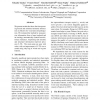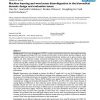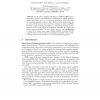2981 search results - page 23 / 597 » Word Sense and Subjectivity |
EMNLP
2007
13 years 8 months ago
2007
We present results that show that incorporating lexical and structural semantic information is effective for word sense disambiguation. We evaluated the method by using precise in...
ACL
1998
13 years 8 months ago
1998
In this paper we describe a method for performing word sense disambiguation (WSD). The method relies on unsupervised learning and exploits functional relations among words as prod...
BMCBI
2006
13 years 7 months ago
2006
Background: Word sense disambiguation (WSD) is critical in the biomedical domain for improving the precision of natural language processing (NLP), text mining, and information ret...
COLING
2008
13 years 8 months ago
2008
In this paper, an extension of a dimensionality reduction algorithm called NONNEGATIVE MATRIX FACTORIZATION is presented that combines both `bag of words' data and syntactic ...
CORR
2000
Springer
13 years 7 months ago
2000
Springer
In this paper Schapire and Singer's AdaBoost.MH boosting algorithm is applied to the Word Sense Disambiguation (WSD) problem. Initial experiments on a set of 15 selected polys...



